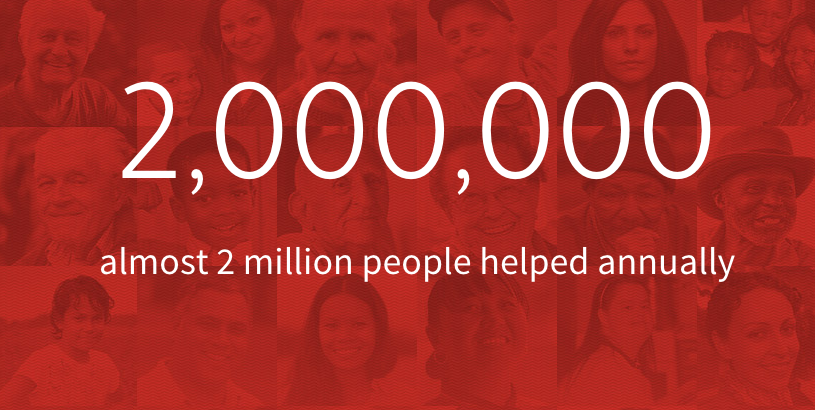
A Culture of Accountability By Mike King
 A Culture of Accountability – Being on Mission at Volunteers of America
A Culture of Accountability – Being on Mission at Volunteers of America
In leading an organization that helps the most vulnerable members of our society, a culture of accountability means much more to me than answering to my board of directors or meeting financial benchmarks. Failing in our mission can literally mean the difference between life and death for those we serve. At the very least, failing to live up to expectations creates an additional barrier blocking our clients from transcending their challenges and living the best lives possible.
Before taking over as Volunteers of America’s national president, I spent five years as CEO of our Texas affiliate. Our administrative offices shared building space with our client programs, mostly for those with intellectual disabilities. While it can be easy for a top executive to become detached from an organization’s work and lose perspective, it’s almost impossible not to be accountable when you come face-to-face everyday with the people who need you.
If anyone, then, knows the good they ought to do and doesn’t do it, it is sin for them. ~ James 4:17
Founded in 1896 by Christian reformers Maud and Ballington Booth, Volunteers of America is one of the oldest and largest human service providers in the United States, dedicated to a mission of helping those in need live healthy, safe and productive lives. With an annual budget of $1.1 billion, our 32 affiliates and 16,000 paid staff people serve more than 2 million individuals each year. Our foundation in faith has always been the most important aspect of maintaining Volunteers of America’s culture of accountability, especially in an organization as sprawling as ours.
At Volunteers of America, we see ourselves as a church without walls, answering God’s call to transform communities through a ministry of service that demonstrates to all people that they are loved. This ministry distinguishes our organization. Our ministers — consisting of front-line workers, administrative leaders and board members, at both the local and national levels, are drawn from every Christian denomination and are encouraged to serve as active members of other churches. These ministers lead in making sure our work remains accountable to our mission, and that our service to those who need us comes from a place of compassion and dedication.
Accountability also means being good stewards of the resources entrusted to us. Donors have become increasingly savvy about the organizations they support. They demand evidence that our operations are efficient and that our resources support our mission and clients.
Whoever can be trusted with very little can also be trusted with much, and whoever is dishonest with very little will also be dishonest with much. ~ Luke 16:10
The IRS does not require Volunteers of America, as a church, to file a Form 990 — the federal tax filing required of nonprofit organizations — but we complete a pro forma form each year regardless and make it available online and to anyone wishing to know more about our finances. We also work closely with groups like Better Business Bureau’s Wise Giving Alliance and GuideStar to make sure accountability reports for our organization remain up-to-date and accurate. Not only is it right to remain accountable to those who provide the money we need to operate, accountability also provides a pragmatic benefit that ultimately attracts new resources in a virtuous cycle.
For me, remaining accountable — both to those we serve and to our donors — means not just tending to our clients’ immediate needs, but also sticking with them over the long term. We see our services as a continuum of care. Many clients remain within our fold for years if needed. For example, someone experiencing homelessness might come to us in need of shelter, which then allows us to assess what caused him or her to be homeless in the first place and ultimately provide transitional or permanent housing. Being accountable means we must be prepared to be with them every step of the way.
Volunteers of America’s founders described our special role as “an organization, which brings together the work of the church and the work of the social service organization.” We are both a church and an “auxiliary” to the universal Christian church with a special mission of service, and we are able to transform lives through our belief in, and reliance on, grace. It is this principle, more than anything that keeps us accountable to those who need us most.
####
Mike King serves as national president and CEO of Volunteers of America and also sits on the executive committee of Leadership 18. This post is an excerpt from the 2016 Winter edition of Outcomes Magazine.
Today is your opportunity to join Christian Leadership Alliance (CLA), a world-changing Alliance of global leaders and organizations.
Make a wise investment in your professional development.
Gain access to a network of Christian leaders who share your values.
Encounter the spiritual inspiration that will keep you running your race with excellence.
Join CLA.

Equip. Unite. Transform.
www.ChristianLeadershipAlliance.org

What is Christian Leadership Alliance?
Christian Leadership Alliance equips and unites leaders to transform the world for Christ. We are the leaders of Christ-centered organizations who are dedicated to faithful stewardship for greater kingdom impact.
Sign up for FREE blog updates.
Upcoming Events
Check back later!


